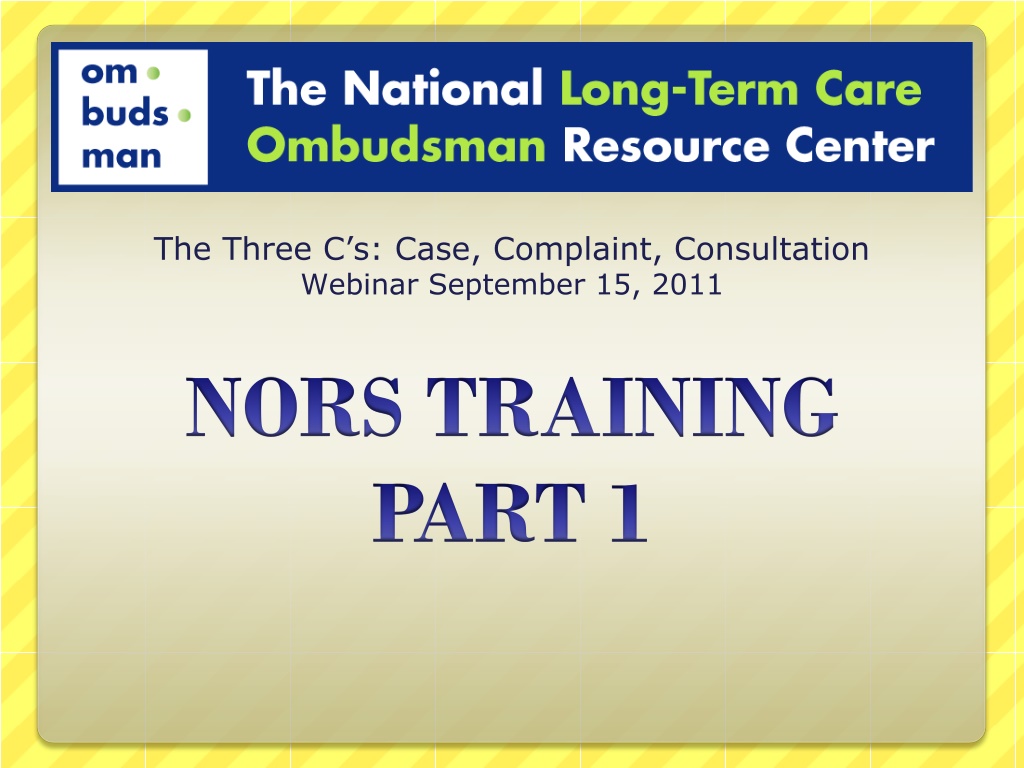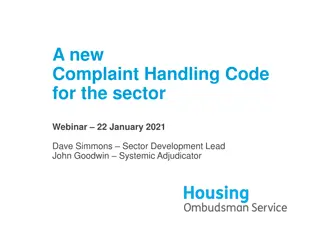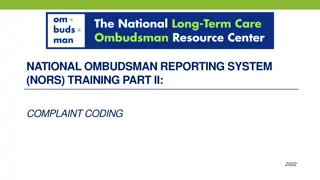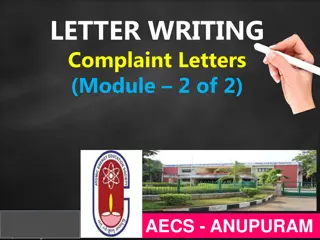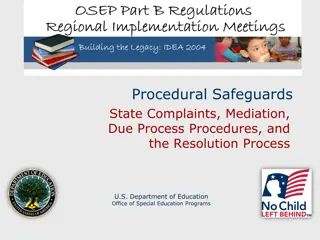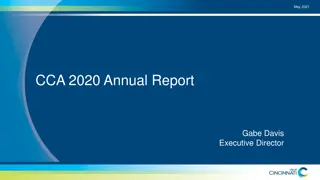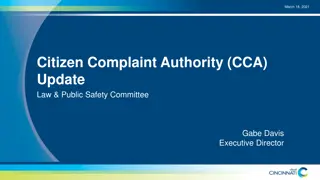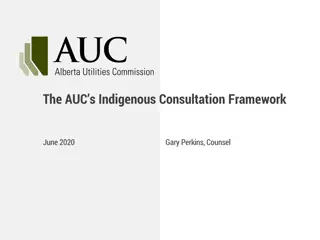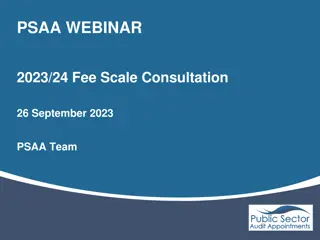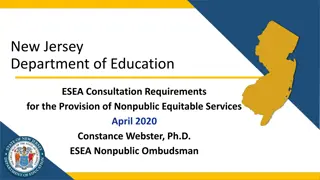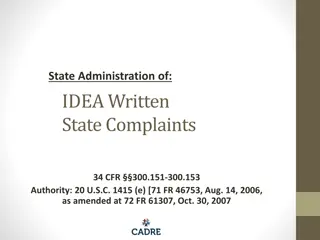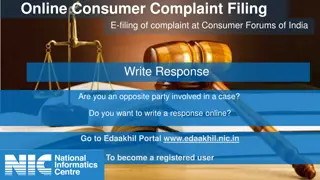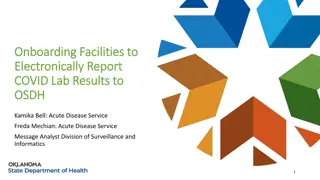Understanding the Three Cs: Case, Complaint, Consultation in Reporting Systems
This content outlines the importance of improving consistency in reporting systems through effective handling of cases, complaints, and consultations. It explains the significance of differentiating between these elements and provides insights on their definitions and processes, aiming to enhance clarity and accuracy in data reporting.
Download Presentation

Please find below an Image/Link to download the presentation.
The content on the website is provided AS IS for your information and personal use only. It may not be sold, licensed, or shared on other websites without obtaining consent from the author. Download presentation by click this link. If you encounter any issues during the download, it is possible that the publisher has removed the file from their server.
E N D
Presentation Transcript
The Three Cs: Case, Complaint, Consultation Webinar September 15, 2011 NORS TRAINING PART 1
PURPOSE of TRAINING Improve consistency in NORS reporting Provide clarifying information on Case, Complaint, and Consultation by: Practice application Discuss the why s Discuss answers or examples that remain unclear Provide information about the process for obtaining a vetted response when questions arise in the future.
NORS The Older Americans Act requires States to: collect ombudsman complaint data and for the State ombudsman to report aggregate data to AoA. In fiscal year 1995, AoA implemented an ombudsman complaint reporting system called the National Ombudsman Reporting System (NORS).
AoAs Perspective Louise Ryan Aging Program Specialist for the Long-Term Care Ombudsman Program Administration on Aging Washington, DC
WINC Perspective and Process Shelley Hitt, Colorado State Ombudsman Chair, NASOP WINC Committee (303) 722-0300 x 508 1-800-288-1376 skhitt@thelegalcenter.org Working to Improve NORS Consistency
Three Cs Basic Principles CASE is an Inquiry brought to, or initiated by the LTCO, on behalf of a resident or group of residents, involving 1 complaints which requires opening a case and includes LTCO investigation, strategy to resolve, and follow-up. Also If the LTCO and another agency are both actively involved in investigation and resolution, it is also a LTCO case. The number of cases is equal to the number of complainants. One or more people jointly filing complaint count as one complainant.
Three Cs Basic Principles COMPLAINT: Concern brought to, or initiated by, LTCO for investigation and action: On behalf of 1 residents and Relating to the health, safety, welfare or rights of a resident. Tips: One or more complaints constitute a case. You cannot have a case without a complaint.
Three Cs Basic Principles CONSULTATION: Providing information and assistance to an individual or a facility. It does not involve investigating and working to resolve complaints. ( case) If LTCO refers someone with a concern to another agency and is not actively involved in investigating and working to resolve the problem, it is not LTCO case or complaint.
QUIZ: Which C is correct? 1. A woman calls asking for information on care planning and how to select a nursing home for her mother.
QUIZ #1 1. A woman calls asking for information on care planning and how to select a nursing home for her mother. It is one consultation to an individual.
QUIZ #2 2. You visit Mrs. Jones, who tells you they are still bringing her pureed food, even though her doctor said she could start eating regular food. You notice her call bell is broken. She indicates she would appreciate your assistance in resolving these problems. You speak to the DON about the call bell, and she promptly fixes the bell. You attempt to talk to the dietician about the pureed food, but she is not available until the next morning. You leave Mrs. Jones but tell her that you will check back with the dietician and will follow up with her on the results and to ensure that the call bell is still functional.
QUIZ #2 1 case, 2 complaints: pureed food and broken call light It can t be closed until both complaints are disposed. The complainant is Mrs. Jones, the resident. Why? Even though you, the LTCO, notice the call bell, this is still Mrs. Jones case and you can have only one complainant for each case. Is the call bell a complaint or a request? How do you decide? Tip: Is the LTCO responding to a concern and facilitating communication? A messenger? Not a complaint.
QUIZ #3 3. A CNA approaches you about a labor dispute in the facility. She asks you to intervene with management on behalf of the staff, which is threatening to strike if they don t get health coverage.
QUIZ #3 3. A CNA approaches you about a labor dispute in the facility. She asks you to intervene with management on behalf of the staff, which is threatening to strike if they don t get health coverage. This is not a case, and the LTCO should not intervene. Why? Because it is not made by or on behalf of a resident or residents. If you provide information or suggestions, it could be counted as a consultation to a facility staff person.
QUIZ #4 4. Your state requires that all allegations of abuse be reported to the Adult Protective Services agency or the police and that the ombudsman program be notified. You receive a routine notification from APS, which is investigating the allegation.
QUIZ #4 4. Your state requires that all allegations of abuse be reported to the Adult Protective Services agency or the police and that the ombudsman program be notified. You receive a routine notification from APS, which is investigating the allegation. This is neither a case nor a consultation. Why? The ombudsman program is not actively involved in investigating and working to resolve the complaint.
QUIZ #5 5. Mrs. Oliver asks you to help her obtain the medical records for her mother, who recently died in a nursing home; she is the executor of her mother s will and was her health care durable power of attorney. She is planning to use the records in a private action lawsuit against the facility.
QUIZ #5 1 case with 1 complaint or no case Consider: For whom the complaint is made, Policies on working on cases involving residents who are deceased, and Whether the situation could affect other residents (access to records). IF it is a case, the complainant is Mrs. Oliver. IF it is not a case, it is a consultation. LTCO provides information on process to access resident records.
QUIZ #6 6. A nursing home staff person tells you that Mrs. Smith s son, who has power of attorney for his mother, is verbally abusing Mrs. Smith, using her income for his own purposes and has not paid her bill for three months. The staff person requests your involvement in resolving the non-payment issue.
QUIZ #6 6. A nursing home staff person tells you that Mrs. Smith s son, who has power of attorney for his mother, is verbally abusing Mrs. Smith, using her income for his own purposes and has not paid her bill for three months. The staff person requests your involvement in resolving the non-payment issue. 1 case, 2 complaints The facility staff is the complainant. If the resident is at risk of discharge for nonpayment then a third complaint could be added.
QUIZ #7 7. Mr. Jones calls the ombudsman program, complaining that his mother has a black eye and the facility can give no explanation for it. An ombudsman representative visits his mother and notices light bruises on her face and arms, but cannot verify that she had a black eye.
QUIZ #7 7. Mr. Jones calls the ombudsman program, complaining that his mother has a black eye and the facility can give no explanation for it. An ombudsman representative visits his mother and notices light bruises on her face and arms, but cannot verify that she had a black eye. 1 case and 1 complaint Why? LTCO open cases whether the complaint can be verified or not. The complainant is Mr. Jones, the son.
QUIZ #8 8. Mr. Brown s daughter (and guardian) Alice, calls the ombudsman program, concerned that her father is eating all his meals in his room, instead of in the dining room. You visit Mr. Brown, who seems despondent and is unable to express his wishes. You speak with the DON about Alice s concern; the DON says staff should be taking Mr. Brown to the dining room and that she will discuss the problem with two new aides and also put a note in Mr. Brown s chart. The following week you call Alice, who tells you the aides are now taking her father to the dining room and he appears much happier.
QUIZ #8 8.Mr. Brown s daughter (and guardian) Alice, calls the ombudsman program, concerned that her father is eating all his meals in his room, instead of in the dining room. You visit Mr. Brown, who seems despondent and is unable to express his wishes. You speak with the DON about Alice s concern; the DON says staff should be taking Mr. Brown to the dining room and that she will discuss the problem with two new aides and also put a note in Mr. Brown s chart. The following week you call Alice, who tells you the aides are now taking her father to the dining room and he appears much happier. 1 case, 1 complaint made by Alice, a relative and the guardian
QUIZ #9 9. Ms. Miller, a resident of Sunny Valley Assisted Living Facility, stops you in the hall and tells you she has a problem: her son, who lives at home, has just been terminated from the Medicaid program and she is concerned he won t be able to pay for his medication. As she wheels off in her wheelchair, you notice that the wheelchair keeps veering to the left and hitting the wall. You ask if she would like your assistance in getting it fixed, or getting a new chair. She replies, yes.
QUIZ #9 1 case, 1 complaint Ms. Miller, the resident, is the complainant. Why? Even if the LTCO brings a problem to the resident's attention, once the resident acknowledges the problem and gives the LTCO permission to resolve the problem, then the resident should be named as the complainant. If you tell her how her son can appeal the Medicaid determination, you could document that as a consultation to an individual.
QUIZ #10 10. A facility administrator calls you to complain that the volunteer ombudsman assigned to his home is not doing her job. He explains that he called her about a problem the facility was having with a resident s behavior, but she refused to address the facility s concern and instead visited privately with the resident and refused to tell the administrator or the corporation s lawyer about her visit.
QUIZ #10 It is not a case. Why? It was not made by or on behalf of the resident. It could be a consultation to facility staff. Another consideration: The LTCO may decide to initiate a complaint on behalf of the resident, depending on what the resident says or what the LTCO observes.
BONUS On December 15th you go to Hilltop Haven to visit Mrs. Lee. Her daughter called you to complain that her mother would like to be bathed more often than once a week. On your way to Mrs. Lee's room you notice that there is dirty laundry on the floor in the hall and that the hall is dark because several lights are not working. After you visit Mrs. Lee, you stop in to see Mrs. James. She tells you that they stopped her physical therapy and she does not know why and she complains that the sliding track for the privacy curtain is broken, so it does not close all the way. You investigate both complaints. You resolve and close the PT complaint within the week. You learn that the facility has tried to order a new track, but it s on back order. You keep the complaint open until the new track is installed. You go back to visit Mrs. James on January 15th. She tells you that they are installing the track the next day. She also tells you that the she just received a notice from the facility saying that she will have to switch to the facility pharmacy even though it may cost more than the pharmacy she's been using for the past three years. You tell her you'll check into it for her.
BONUS Open three cases: Mrs. Lee, resident 1 complaint Ombudsman 2 complaints Why? A LTCO should be the complainant when permission from a resident or her representative cannot be obtained or when permission of a resident is not necessary because numerous residents are affected by the problem, such as a general environmental concern. Mrs. James, resident 3 complaints Why? It is possible that Mrs. James s pharmacy complaint could be a separate case/complaint. Whether you open 1 or 2 cases for Mrs. James depends on your state s policy and also the amount of time between her complaints. For example, if she registered one or more concerns in December and January and all the complaints were resolved in February, you would close the case in February. If she then registered one or more concerns in March, you would open a new case. However, in the case cited, it s both a judgment call and a state policy call.
SUMMARY Case Complaint Consultation Consider: Is action needed by, or on behalf of residents and relating to health, safety, welfare or rights of residents? What action is taken by the LTCO?
NORS Training Part II Thursday September 29, 2011 Watch for registration announcement.
The National Long-Term Care Ombudsman Resource Center (NORC) www.ltcombudsman.org The National Consumer Voice for Quality Long-Term Care (formerly NCCNHR) http://www.theconsumervoice.org/ This presentation was supported, in part, by a grant from the Administration on Aging, Department of Health and Human Services.
